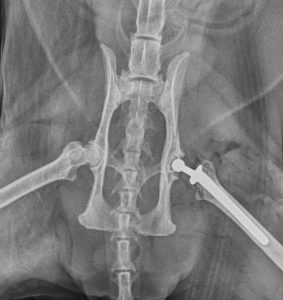
Charlie’s story shares some of the common issues that older cats face, and how successful management means they can continue to live life to the full.
Last year, shortly before his 13th birthday, Charlie was diagnosed with an overactive thyroid gland. This is a relatively common condition in older cats, causing them to present with a number of symptoms such as weight loss despite a good appetite, poor coat, vomiting/diarrhoea and changes in behaviour. Left untreated it can cause heart disease or high blood pressure.
Treatment options for an overactive thyroid gland include medication, radioactive iodine treatment, surgery and a special diet. Charlie’s owners opted for him to have an operation to remove the overactive thyroid gland, and he has continued to do well following this. You can read more about hyperthyroidism in cats here.
Later in 2022 Charlie’s owner completed a questionnaire and realised that Charlie was likely suffering from arthritis. Arthritis is common in older cats, but they hide any evidence of pain well. Signs may include reluctance to jump up or down onto or off surfaces, reluctance to play or use the stairs, and changes in behaviour e.g. sleeping in different places, toileting inappropriately, or becoming grumpy or withdrawn.
Further investigation revealed that Charlie had painful hips, and x-rays confirmed hip arthritis. There are various treatment and management strategies available to help cats with arthritis, you can read more here. Charlie was initially treated with medication to relieve his arthritic pain. His owner also decided to pursue total hip replacement surgery for Charlie to treat the most severely affected hip. We are pleased to report he recovered well from his operation and continues to do well.
If you are concerned your cat may have arthritis, book an appointment with one of our vets. We also offer an older pet screening clinic with our nurses, which helps to diagnose conditions like an overactive thyroid at an early stage.

Charlie’s New Hip
